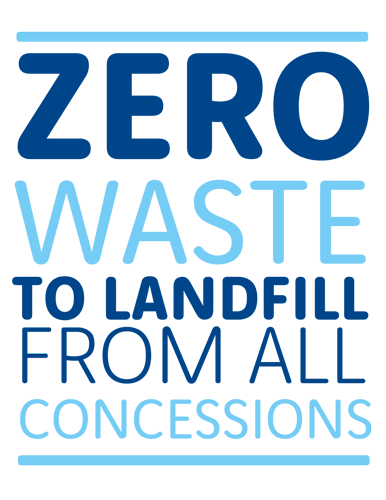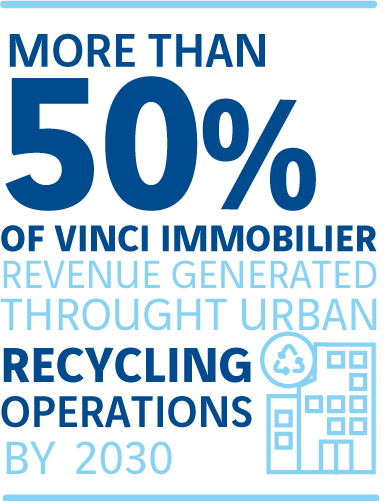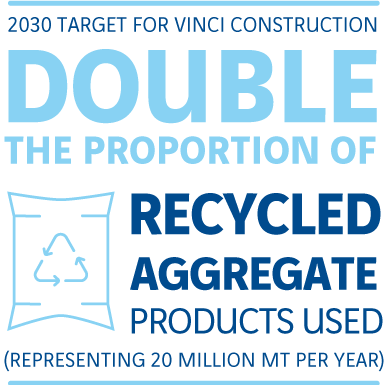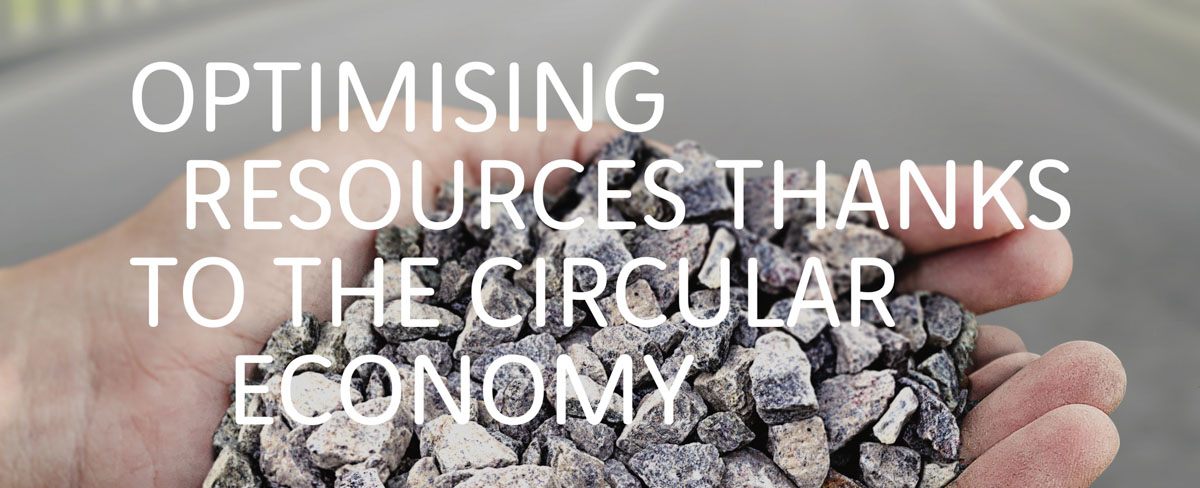
Given the growing scarcity of natural resources, VINCI intends to limit its impact by moving towards a circular economy. This includes improving our design and production processes, reducing the volume of virgin raw materials extracted, implementing efficient techniques, adopting effective behaviour patterns, as well as reusing and recycling.
RETHINKING THE WAY WE CONSUME, PRODUCE AND MANAGE OUR RESOURCES
VINCI intends to limit the impact of its activities by moving towards a circular economy. Doing this entails rethinking our supply chain to reduce the extraction of virgin raw materials, consume mainly reused or recycled products and sustainable materials, and significantly reduce the waste we produce. This means bringing all our suppliers, clients and partners together to find the best ways to reduce the use of virgin raw materials, and reuse the waste we inevitably generate as a resource for our own or other activities – with a focus on encouraging local solutions. For example, we offer clients recycled materials made with waste generated by our own activities.
VINCI IS MOVING
TOWARDS A CIRCULAR ECONOMY.
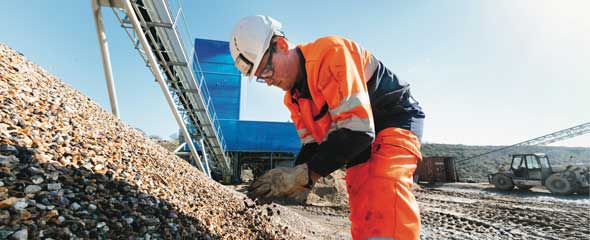
A STRATEGY OF CONTINUOUS IMPROVEMENT
VINCI believes committing to a circular economy approach means revising all its current procedures. The key challenge is to limit our footprint by reducing the volume of virgin raw materials extracted, implementing efficient techniques, adopting effective behaviour patterns, as well as reusing and recycling.
Focusing on our sourcing means improving our waste management, especially by developing innovative solutions to reduce and recover both our own and our clients’ waste.

VINCI’s aims to apply a circular economy approach to all our activities.
Promote construction techniques and materials that economise on natural resources
As raw materials sourcing is a central issue, we use eco-design approaches to projects and give precedence to reused or recycled materials.
ACTIONS TAKEN
Eco-design
• Using smaller amounts of resources in construction by eco-designing projects and reducing waste at source.
• Filing patents on eco-designed products.
Supply chain
• Favouring the use of secondary, recycled or reused materials in each major supply chain (aggregates, steel, inert materials, biomass, etc.).
• Encouraging the use of reusable or recycled materials when serving as programme manager on concessions.
Improve waste sorting and recovery
VINCI is taking action to reduce the amount of waste generated by its construction activities and its concession users and to systematically recover it.
ACTIONS TAKEN
Reducing waste at source
• Implementing plans to manage waste materials at worksites.
• Rolling out programmes to phase out single-use plastic products at some entities in partnership with retail brands.
Recovery
• Improving waste sorting.
• Systematically recovering waste (including targets by geographic area at some entities).
Expand the offer of recycled materials to limit extraction of virgin materials
Some of our business activities involve producing materials (quarrying, in particular). Their principal goal is to develop more alternatives to raw materials, i.e. offer recycled materials and expand their recycling capacity.
ACTIONS TAKEN
Recycling
• Increasing the number of permanent sites able to take in and process recycled materials.
Development
• Promoting our choice of recycled materials.

KEY FIGURES 2023
16 Mt of recycled aggregate pavement out of VINCI Construction’s total annual production.
18 sites with zero waste to landfill for VINCI Concessions.
50% of reclaimed asphalt pavement from VINCI Autoroutes recycled at its own worksites.
70% of VINCI Immobilier’s revenue generated through land recycling.
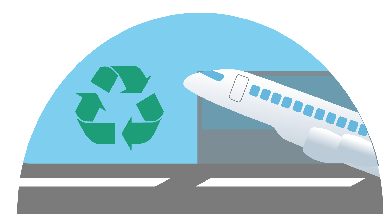
“Zero waste to landfill” airports
After VINCI Airports took over the concession for Salvador Bahia airport in January 2018, it became the first Brazilian airport to set itself the target to recover all its waste. The airport’s large-scale environmental requalification programme included creating a new sorting centre with an optimised waste management system. All the airport’s waste was recovered in 2020, compared with 1% before VINCI Airports became the concession holder. The programme also focused on creating a plant to treat all the airport’s wastewater and recycle it in toilets, green areas and airport air-conditioning. Salvador Bahia was recognised as “Brazil’s most sustainable aerodrome” by Brazil’s National Civil Aviation Agency and also received several international awards, including “ACI-LAC Green Airport Recognition”.
100%
OF WASTE RECOVERED AT SALVADOR BAHIA AIRPORT.
SALVADOR BAHIA NAMED BRAZIL’S MOST SUSTAINABLE AERODROME BY NATIONAL CIVIL AVIATION AGENCY.
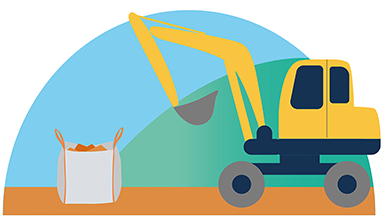
Aggregate recycling and recovery with Granulat+
In France, annual aggregate requirements amount to 560 Mt. With 130 Granulat+ sites across France, Eurovia (VINCI Construction) offers a range of alternative construction materials. The idea is to use fewer quarried materials by recycling inert worksite waste. Eurovia, which combines this activity with its quarry business, has become France’s leader in recycled construction materials with an annual production of 8.5 Mt.
12
MILLION TONNES OF RECYCLED CONSTRUCTION MATERIALS PRODUCED THROUGHOUT THE WORLD IN 2021, OF WHICH 8.5 MILLION TONNES IN FRANCE.
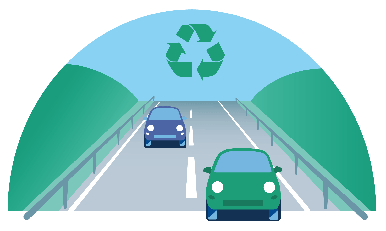
Fully recycled roads
Eurovia (VINCI Construction) has developed an innovative very-high-percentage recycled road renovation process using a specific mobile continuous asphalt plant designed in partnership with Marini-Ermont. After completing a 1 km test section of the world’s first fully recycled road on the VINCI Autoroutes motorway network in France in 2018, Eurovia applied the process to road sections in three French departments (Charente, Charente-Maritime and Vienne) and on the A89 motorway. It was able to increase the aggregate recycling rate to 70% by reusing planed material as a new road surface layer directly on-site.

Blastfurnace slag to replace cement
To produce its Exegy® low-carbon concrete, VINCI Construction replaces clinker – the main component in traditional cement and largest source of greenhouse gas emissions – with alternative binders made from blastfurnace slag. Ground slag, a by-product from the manufacture of iron, is recovered in this way. VINCI Construction also teamed up with specialist Ecocem to develop an innovative solution that activates the ground slag increasing the clinker replacement rate to nearly 100%. Exegy® is a way of recycling blastfurnace slag in concrete that still offers the same technical properties as traditional concrete, and notably the same degree of resistance. It was used, for example, to construct l’archipel, VINCI Group’s new head office – the first time it was used for the structural elements of a building in France. At the same time, VINCI Construction is conducting a research and development programme into the suitability of other alternative mineral binders.
100 %
A CLINKER REPLACEMENT RATE OF NEARLY 100%.

Digital solutions and optimised worksite waste management
Incubated and accelerated by Leonard, the Group’s innovation and foresight platform, Waste Marketplace is a digital solution that facilitates management of waste from worksites, operations and industry, and improves its recycling and traceability at the best possible cost. In four clicks on the application, a works supervisor on site can order a waste removal lorry. The app’s algorithm chooses the best solution for each type of waste from among a network of partners, resulting in a recycling rate of more than 80%. The system automatically generates a report at each stage and guarantees absolute traceability. Waste Marketplace has already rolled out its solution across more than 1,000 sites since it was set up in 2018 and is seeking to rapidly diversify its client base and business lines.
80%
WASTE MARKETPLACE ACHIEVES A RECYCLING RATE OF MORE THAN 80%.
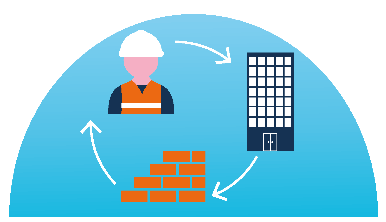
Reusing worksite materials
The construction sector is moving towards a circular economy with the 3R concept of “reduce, reuse and recycle”. La Ressourcerie du BTP is a concrete example of the circular economy model. The marketplace, which was developed at the Group’s innovation and foresight platform, Leonard, aims to promote the reuse of materials from finishing works and offer employment opportunities to people on integration programmes. In 2023, La Ressourcerie du BTP will develop its engineering operations at the tender and works stage and will strive to structure the reuse sector.
Alongside this platform, the R.used initiative aims to develop an app that will list materials and equipment that remain unused at the end of projects, as well as the needs of ongoing and upcoming projects.
LA RESSOURCERIE IS A MARKETPLACE THAT ENCOURAGES AND FACILITATES THE REUSE OF MATERIALS.
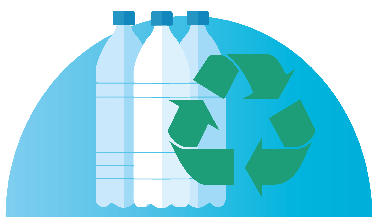
Encouraging motorists in Lima, Peru to recycle their plastic waste
Pex, the Peruvian automatic toll collection subsidiary of VINCI Highways, enables its users to pay for toll and parking services in Lima by recycling plastic bottles. Drivers can deposit plastic bottles in a recycling robot which, using artificial intelligence, evaluates the value of the materials deposited and automatically assigns “green credits” for each bottle deposited. The amount can be consulted directly on the mobile application and can then be used as a means of payment for the various services on offer, such as subscriptions to Lima’s expressways or parking in the Real Plaza car parks in the Peruvian capital.
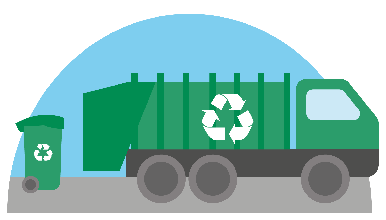
Smart Waste Management
Optimised waste management involves streamlining waste transport. Axians (VINCI Energies) helps its clients optimise waste collection. In the Netherlands, for example, sensors placed in the containers alert waste managers when they are full so they can optimise vehicle sizes and collection routes.
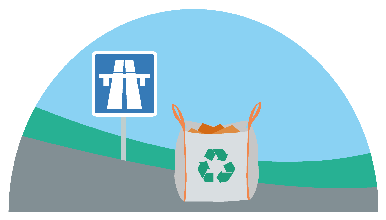
Recovering waste from service stations
VINCI Autoroutes aims to recover 100% of operational waste from the service stations it owns and manages by 2025, transforming it into energy or matter. Indeed, 60% of operational waster will be transformed into matter.
VINCI Autoroutes will help to recover customer waste in special bins, collecting 80% of packaging and 90% of glass waste at the service stations it owns and manages.

